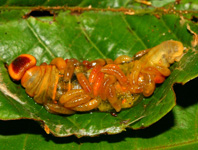Abstract
Catenulida are mostly inhabitants of freshwater ecosystems, like ponds, streams, though the marine species are few (Larsson and Willems, 2010). About 110 species of catenulids are known worldwide, with most of the studies conducted in South America (Marcus, 1945a, 1945b; Noreña et al., 2005), North America (Kepner and Carter 1931; Nuttycombe and Waters, 1938) and Scandinavian Peninsula (Luther, 1960, Larsson and Willems, 2010; Larsson et al., 2008). The diversity of catenulids from India has not been studied intensively; however some reports on other turbellaria exists for the country (Annandale, 1912; Whitehouse, 1913; Kapadia, 1947; Basil and Fernando, 1975; Apte and Pitale, 2011; Kalita and Goswami, 2012; Venkataraman et al., 2015). The genus Stenostomum, however, has been studied extensively around the world with identification of over 60 species (Tyler et al., 2006-2016). This is first report of the genus from India. The present study was part of the project to catalogue the diversity of free living protozoan ciliates from the Hooghly stretch of the Ganga River during which the flatworms were found. The worms were studied based on the live observations, with recognition of characters which led to its identification. This study serves to fill knowledge gap in the freshwater flatworms from India.
References
Ammermann, D., Steinbruck, G., von Berger, L. & Hennig, W. (1974) The development of the macronucleus in the ciliated protozoan Stylonychia mytilus. Chromosoma, 45, 401–429.
https://doi.org/10.1007/BF00283386
Annandale, N. (1912) Caridinicola, new type of Temnocephaloidea. Records of the Indian Museum, 7 (2), 243–252.
https://doi.org/10.5962/bhl.part.28234
Apte, D. & Pitale, R.D. (2011) New records of polyclad flatworms (Platyhelmenthes: Turbellaria) from coral reef of Lakshadweep Island, India. Journal of Bombay Natural History Society, 108 (2), 109–113.
Basil, J.A. & Fernando, RS. (1975) Ecological notes on the Indian freshwater Microturbellaria: Mesostoma sp. Journal of Bombay Natural History Society, 72 (3), 875–876.
Kalita, G. & Goswami, M.M. (2012) Diversity and ecology of turbellarian animals in Deepar wetland of Assam, India. Records Zoological Survey of India, 112 (Part-2), 107–112.
Kapadia, G.A. (1947) Note on the occurrence of Bipalium in Junagadh Kathiawar. Journal of Bombay Natural History Society, 47 (1), 178–180.
Larsson, K. & Willems, W. (2010) Report on freshwater Catenulida (Platyhelminthes) from Sweden with the description of four new species. Zootaxa, 2396 (1), 1–18.
https://doi.org/10.11646/zootaxa.2396.1.1
Larsson, K., Ahmadzadeh, A. & Jondelius, U. (2008) DNA taxonomy of Swedish Catenulida (Platyhelminthes) and a phylogenetic framework for catenulid classification. Organisms, Diversity and Evolution 8, 399–412.
https://doi.org/10.1016/j.ode.2008.09.003
Luther, A. (1960). Die Turbellarien Ostfennoskandiens. Fauna Fennica, 7, 1–155.
Marcus, E. (1945a) Sobre Catenulida brasileiros. Boletins da Facultade de Filosofia, Ciencias e Letras Zoologia, 10, 3–133.
https://doi.org/10.11606/issn.2526-4877.bsffclzoologia.1945.125197
Marcus, E. (1945b) Sobre Microturbelarios do Brasil. Comunicaciones Zoologicas del Museo de Historia Natural de Montevideo, 1 (25), 1–74, Est I–XI.
Noreña, C., Damborenea, C. & Brusa, F. (2005) A taxonomic revision of South American species of the genus Stenostomum O. Schmidt (Platyhelminthes: Catenulida) based on morphological characters. Zoological Journal of the Linnean Society, 144, 37–58.
https://doi.org/10.1111/j.1096-3642.2005.00157.x
Nuttycombe, J. & Waters, A. (1938) The American species of the genus Stenostomum. American Philosophical Society, 79, 213–301.
Tranchida, M.C., Maciá, A., Brusa, F., Micieli, M.V. & García, J.J. (2009) Predation potential of three flatworm species (Platyhelminthes: Turbellaria) on mosquitoes (Diptera: Culicidae). Biological Control, 49, 270–276.
https://doi.org/10.1016/j.biocontrol.2008.12.010
Tyler, S., Schilling, S., Hooge, M. & Bush, L.F. (Comp.) (2006–2016) Turbellarian taxonomic database. Version 1.7. Available from: http://turbellaria.umaine.edu (accessed 24 June 2020)
Venkataraman, K., Raghunathan, C., Raghuraman, R. & Dixit, S. (2015) Fascinating seaslugs & flatworms of Indian seas. In: Zoological Survey of India. Published by the Director, Zoological Survey of India, Kolkata, pp. 1–149.
Whitehouse, R.H. (1913) Freshwater planaria (Zoological records of the Abor Expedition 1911-12, Part III, No. 22). Records of the Indian Museum, 8, 317–321.
https://doi.org/10.5962/bhl.part.1193
Worna, F.J. & Koopowitz, H. (1998) Behavior of the rhabdocoel flatworm Mesostoma ehrenbergii in prey capture and feeding. Hydrobiologia, 383, 35–40.
https://doi.org/10.1023/A:1003439827920


